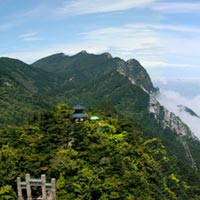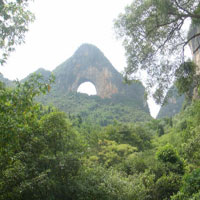UNESCO's Director-General signs an agreement with China establishing the International Research Centre on Karst as a Category II centre

- © UNESCO
- Lushan National Geopark, China
Establishment of an International Research Centre on Karst, in Guilin, China, as a category II centre under the auspices of UNESCO
On 11 February 2008, the Director-General of UNESCO, Mr Koïchiro Matsuura and Mr Wang Shouxiang, Vice-Minister of Land and Resources of the People’s Republic of China, signed an Agreement establishing the International Research Centre on Karst, in Guilin, China as a category II centre under the auspices of UNESCO.
Also present at the signing ceremony was the Ambassador and Permanent of the People’s Republic of China to UNESCO, Ms Shi Shuyun.
Mr Matsuura began his comments following the ceremony by thanking Vice-Minister Shouxiang for having come to Paris to sign “a very important agreement to establish an international centre on Karst in Guilin, China.” He went on to express his appreciation to the Government of the People’s Republic of China for its support in establishing the centre. He noted that People’s Republic of China had the most category II centres under the auspices of UNESCO of any Member State and praised the Chinese Government for its continued support to UNESCO’s work through its existing category II centres in the field of science and education.
The Director-General noted the importance of the study of karst. Karst areas are very fragile environmental landscapes that need extremely careful management in order to sustain the living conditions of their inhabitants. Karst areas affect vast areas of the world as some forty countries and one billion people are exposed to the process of karst formation. The centre will investigate the different environmental and resource problems of karst, such as desertification, pollution of groundwater, collapse of the land surface, floods and droughts.
Mr Matsuura highlighted “the strong cooperation between the Government of the People’s Republic of China and UNESCO in the field of Earth sciences.” The Director-General in particular underscored the Government of China’s support of another important initiative in the field of Earth sciences, namely, the creation of geoparks. The first geoparks conference under the patronage of UNESCO was organized in Beijing in 2004 with the strong support of the Government of the People’s Republic of China. Vice-Minister Shouxiang in turn thanked the Director-General for UNESCO’s strong role in the field of Earth Sciences, notably through its International Geoscience Programme and the geoparks initiative.

Fifteen years ago in 1990, an international working group, led by Professor Yuan Daoxian, Research Fellow of Institute of Karst Geology, Chinese Academy of Geological Sciences (CAGS) and Academician of Chinese Academy of Sciences (CAS), began to carry out an IGCP project on karst science – IGCP-299 “Geology, Climate, Hydrology and Karst Formation” (1990-1994).
Right after IGCP-299, they accomplished successively another two IGCP karst projects, IGCP-379 “Karst Processes and the Carbon Cycle” (1995-1999) and IGCP-448 “World Correlation of Karst Geology and its Relevant Ecosystem” (2000-2004). A new IGCP karst project (IGCP-513 “Global Study of Karst Aquifers and Water Resources”, 2005-2009) is well under way.
The more karst scientists are engaged in research on karst science, the more they feel it necessary to establish an international centre on karst to study karst science on a worldwide scale, to promote the experience and technologies they have obtained in the past 15 years to developing countries, to further develop science and technology for sustainable growth of karst system, which is generally regarded as one of the most fragile environmental systems of the world, and to work out the solutions to the most urgent environmental and resource problems in karst regions.
Karst is a distinctive topography in which the landscape is largely shaped by the dissolving action of water on carbonate bedrock, usually limestone, dolomite, or marble, resulting in unusual surface and subsurface features ranging from sinkholes, vertical shafts, disappearing streams, and springs, to complex underground drainage systems and caves. Karst covers an area of 22 million km2 on the world continental land surface, where 1 billion people are inhabited. The fragile ecology (short of water and soil, geological hazards, etc.), harsh living environment and less-developed economy have drawn close attention of more than 40 karst-developed countries, such as China, United States of America, Russian Federation, France, United Kingdom, Italy, Spain, Viet Nam, Indonesia, Turkey, Australia, Malaysia, Mexico, and so on. The global correlation studies show that owing to the differences in geological, climatic, hydrological and biological conditions, the impact that karst has produced on human life may vary from place to place. To get a good command of these differences is of great importance in the rational development and protection of karst water resources, the reconstruction of karst ecosystem and the sustainable development of karst regions.
In order to deal with karst systems on a worldwide scale and to improve science and technology for sustainable development in karst regions, it is highly necessary to establish such an international research centre on the bases of the previous research results to find out solutions for various environmental and resource problems of karst, such as rock desertification, water quality, surface collapse and flood and drought disasters in karst regions, in service of eradicating poverty, improving social and economic growth and maintaining world peace. An international research centre on karst will contribute actively to the “Agenda 21”, particularly to the sustainable development of karst regions worldwide.
Related links:
:: UNESCO Earth science website
:: Global Networks of National Geoparks
:: UNESCO Natural Sciences in China
- Source:UNESCO SC
- 12-02-2008
- © C. Laluc - Karst in Guilin

